Regulation
We look at how government uses regulation to achieve its objectives and how rules can most effectively be designed and implemented through regulators.
Our latest analysis
See all
A third of regulators haven’t been scrutinised by parliament – this needs to change
New IfG research sets out why parliamentarians are struggling to hold regulators to account – and what they could do better.
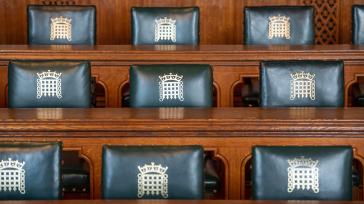
Parliament and regulators
Almost a third of UK regulators have not been scrutinised by parliament since the 2019 general election.

Brexit is not done – and the UK needs to rethink how it manages its relationship with the EU
Whoever wins the election will face seven key Brexit questions.

How is election spending regulated in the UK?
The next election is likely to see record levels of spending by parties and their candidates.
How to reform a regulator: in conversation with Sir Jon Thompson
Sir Jon reflects on his experience of leading a regulator and the role that the Financial Reporting Council plays.
Watch the event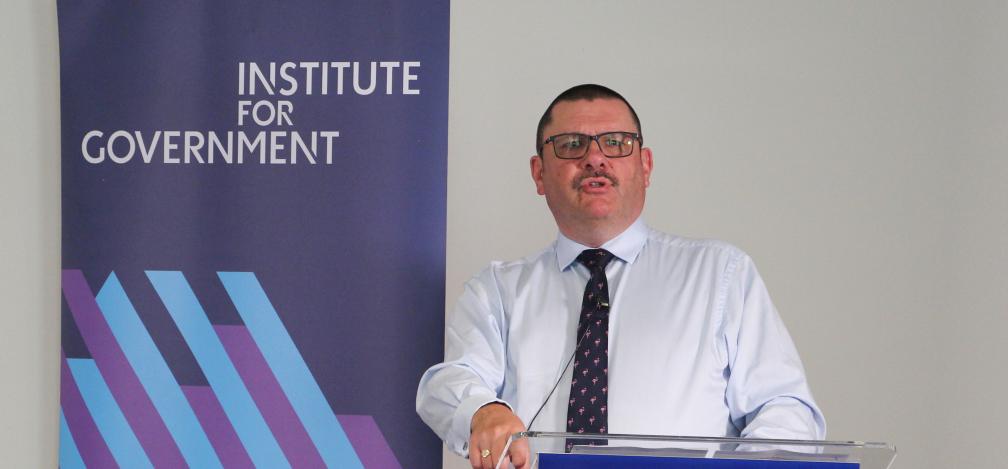
Artificial intelligence

Artificial intelligence: definitions and implications for public services
Artificial intelligence has captured the public imagination, but what is it, how might it be used by government, and what concerns does that raise?

Artificial intelligence: how is the government approaching regulation?
What is the government doing to regulate artificial intelligence, and how is it ensuring alignment with other countries?

Government – and society – must be ready to adapt to artificial intelligence
The government should devote much greater attention to preparing for AI’s impact.
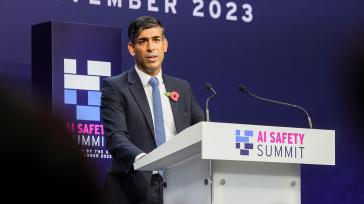
Rishi Sunak’s AI summit gamble paid off
Rishi Sunak has reason to consider his AI summit a success – though voters aren't likely to notice.
Utilities regulation
See all
Energy regulation requires trade-offs the regulator cannot make alone
Government must not cut Ofgem adrift in political seas.

A briefing on the energy market with Jonathan Brearley, Ofgem's Chief Executive Officer
Jonathan Brearley, Ofgem’s CEO, gave a briefing on the energy market, energy bills and what the coming year will mean for consumers.

How much should energy policy and regulation be blamed for price rises?
Giles Wilkes explores the limits of energy policy and regulation – and where the system has failed.

Can anyone chair Ofcom?
Public debate concerning the appointment of Ofcom’s chair has raised questions about whether this is a doable job.
Economic and financial regulation
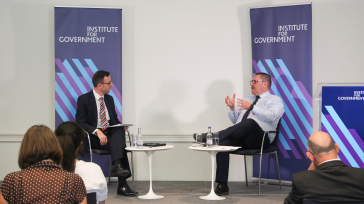
How to reform a regulator: in conversation with Sir Jon Thompson
Sir Jon reflected on his experience of leading a regulator and the role that the Financial Reporting Council plays.

Financial Reporting Council
What is the Financial Reporting Council? What does it do? What powers does it have?
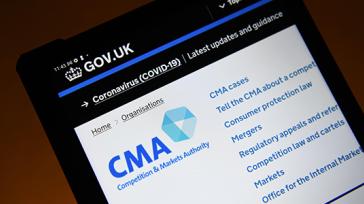
Competition and Markets Authority
The Competition and Markets Authority is the UK’s principal authority responsible for competition and consumer protection.

Rishi Sunak turns to the City in search of Brexit dividends
The government's choices will determine whether embracing regulatory freedom will outweigh the disadvantages of losing access to the single market.
Public body deep dives
We look at how specific public bodies – including regulators – are configured, how they are performing, and what problems they face.
Find out more
Politics and regulation

The Office for Students needs support to assert its independence
If ministers are serious about higher education, they should take on board the recommendations of the recent Lords inquiry into the OfS.

House of Lords report provides clear direction for regulatory reform
'Who watches the watchdogs?' represents the latest contribution to an ongoing debate about how regulators should better be held to account.

Politics and regulation: recipe for conflict or constructive partnership?
The relationship between regulators and politicians was the subject of an event in the IfG and City of London series on government and regulation.

Andrew Tyrie can't be an independent regulator and take the Tory whip
Andrew Tyrie's appointment as a Conservative peer is incompatible with his position as chair of the Competition and Markets Authority.
Regulation after Brexit

Taking back control of regulation
Government must invest time and effort to reap the benefits of post-Brexit regulatory freedoms.

Taking back control of subsidies
A UK state aid regime needs rules and a strong regulator to avoid wasting taxpayer money and protect competition within the UK internal market.

Trade and regulation after Brexit
The government will not be able to conclude a large number of trade agreements at speed and maintain its much-prized regulatory autonomy after Brexit.

Brexit may provide regulatory opportunities, but ministers can’t ignore the costs
The positive vision set out in Iain Duncan Smith’s new report on post-Brexit regulatory freedom fails to acknowledge the trade-offs involved.
Our regulation team

Matthew Gill
Programme Director
Rishi Sunak’s AI summit gamble paid off

Gemma Tetlow
Chief Economist
Four things we learned from Rachel Reeves’ Mais lecture

Olly Bartrum
Senior Economist
Energy regulation requires trade-offs the regulator cannot make alone

Maddy Bishop
Researcher
House of Lords report provides clear direction for regulatory reform

Callum Parris
Research Assistant
